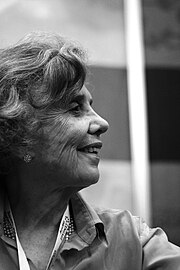Elena Poniatowska
[6] She was raised in France by a grandfather who was a writer and a grandmother who showed her unflattering photographs of Mexico, including some in National Geographic depicting Africans, saying they were Mexican indigenes, and scared her and her siblings with stories about cannibalism there.
But the deprivations of the war became too much and the southern part of France, the Zone libre, was invaded by Germany and Italy in 1942, so the family left for Mexico when she was ten years old.
[4] Poniatowska lives in a house near Plaza Federico Gamboa in the Chimalistac neighborhood of Mexico City's Álvaro Obregón borough.
[5][6] She emerged as a subtly present female voice in a patriarchal society, even as she was called "Elenita" (little Elena) and her work was often dismissed as naïve interviews and children's literature.
[5] Poniatowska most influential work has been "testimonial narratives", writings based both on historical facts and accounts by people normally not recorded by the media.
[7] She began writing on social issues after a visit to Lecumberri, a prison, to interview several incarcerated railway workers who had gone on strike.
[1] Her best-known book of this type is La noche de Tlatelolco, which contains testimony of the victims of the 1968 student massacre in Mexico City.
[4] Poniatowska is one of the founders of La Jornada newspaper; Fem, a feminist magazine; Siglo XXI, a publishing house; and Cineteca Nacional, the national film institute.
[2] She wrote a play, Meles y Teleo: apuntes para una comedia, a year after the birth of son Emmanuel.
[1] In 1997 her novella De noche vienes (You Come by Night) was made into a feature film directed by Arturo Ripstein and starring María Rojo and Tito Vasconcelos.
Her work can be compared to that of Antonio Skármeta, Luis Rafael Sánchez, Marta Traba, Sergio Ramírez, Rosario Ferré, Manuel Puig and Fernando del Paso.
For example, while she heavily criticizes the national institutions which evolved after the Mexican Revolution, she promotes a kind of "popular heroism" of the common person without name.
[9] Like many intellectuals in Mexico, her focus is on human rights issues and defending various social groups, especially those she considers to be oppressed by those in power, which include women, the poor and others.
[5] She has involved herself in the causes of her protagonists which are generally women, farm workers and laborers, and also include the indigenous, such as the Zapatistas in Chiapas in the 1990s.
[2] Her major investigative works include La noche de Tlatelolco (Massacre in Mexico) (1971), Fuerte es el silencio (Strong is Silence) (1975) and Nada nadie.
The book contains interviews with informants, eyewitnesses, former prisoners which are interspersed with poems by Octavio Paz and Rosario Castellanos, excerpts from pre Hispanic texts and newspaper, as well as political slogans.
[2][5][7] Massacre in Mexico was the only book published on the subject for twenty years, contradicting the government's account of the events and the number dead.
Her book about this event Nada, nadie, las voces del temblor was a compilation of eyewitness accounts not only to the destruction of the earthquake, but also to the incompetence and corruption of the government afterwards.
[2][5] Fuerte es el silencio is about several themes, especially the families of disappeared political prisoners, the leaders of workers’ movements, another look at the massacre in Tlatelolco and others who have defied the government.
[2] Based on interviews conducted with the woman who was the model for the main character over a period of some ten years,[5] the book is considered to be a breakthrough in testimonial literature.
The others are Pita Amor, Nahui Olín, María Izquierdo, Elena Garro, Rosario Castellanos and Nellie Campobello.
[8] La piel del cielo (The Skin of the Sky) provides moving descriptions of various regions of Mexico, as well as the inner workings of politics and government.
"[4] In 1979, Poniatowska was the first woman to win Mexico's National Journalism Prize (Premio Nacional de Periodismo)[12] for her contributions to the dissemination of Mexican cultural and political expression.
[2] Poniatowska won the Rómulo Gallegos Prize in 2007 with her book El Tren pasa primero (The Train Passes First).
[1][5] Other awards include the Biblioteca Breve (Breve Library) for the novel Leonora, awards from the Club de Periodistas (Journalists Club), the Manuel Buendia Journalism Prize, and the Radio UNAM Prize for her book of interviews with Mexican authors entitled Palabras Cruzadas ("Crossed Words").
Elena Poniatowska was awarded the Premio Cervantes for her "brilliant literary trajectory in diverse genera, her special style in narrative and her exemplary dedication to journalism, her outstanding work and her firm commitment to contemporary history.



